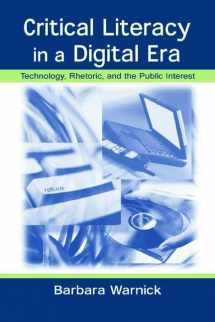
Critical Literacy In A Digital Era
ISBN-13:
9780805841169
ISBN-10:
0805841164
Edition:
1
Author:
Barbara Warnick
Publication date:
2001
Publisher:
Routledge
Format:
Paperback
158 pages
FREE US shipping
Book details
ISBN-13:
9780805841169
ISBN-10:
0805841164
Edition:
1
Author:
Barbara Warnick
Publication date:
2001
Publisher:
Routledge
Format:
Paperback
158 pages
Summary
Critical Literacy In A Digital Era (ISBN-13: 9780805841169 and ISBN-10: 0805841164), written by authors
Barbara Warnick, was published by Routledge in 2001.
With an overall rating of 4.2 stars, it's a notable title among other
books. You can easily purchase or rent Critical Literacy In A Digital Era (Paperback) from BooksRun,
along with many other new and used
books
and textbooks.
And, if you're looking to sell your copy, our current buyback offer is $0.44.
Description
Critical Literacy in a Digital Era offers an examination of the persuasive approaches used in discussions on and about the Internet. Its aim is to increase awareness of what is assumed, unquestioned, and naturalized in our media experience. Using a critical literacy framework for her analysis, author Barbara Warnick argues that new media technologies become accepted not only through their use, but also through the rhetorical use of discourse on and about them. She analyzes texts that discuss new media and technology, including articles from a major technology-oriented periodical; women's magazines and Web sites; and Internet-based political parody in the 2000 presidential campaign. These case studies bring to light the persuasive strategies used by writers to influence public discourse about technology.
The book includes analyses of narrative structures, speech genres, intertextuality, argument forms, writing formulae, and patterns of emphasis and neglect used in traditional and new media outlets. As a result, this distinctive work identifies the features of online speech that bring people and ideas together and enable communities to form in new media environments.
As a unique study of the ways in which ideology is embedded in rhetorical texts, this volume will play a significant role in the development of critical literacy about writing and speech concerning new communication technology. It will be of interest to readers concerned about how our talk about communication affects how we think about it, in particular those interested in communication and social change, public persuasion, and rhetorical criticism of new media content.
The book includes analyses of narrative structures, speech genres, intertextuality, argument forms, writing formulae, and patterns of emphasis and neglect used in traditional and new media outlets. As a result, this distinctive work identifies the features of online speech that bring people and ideas together and enable communities to form in new media environments.
As a unique study of the ways in which ideology is embedded in rhetorical texts, this volume will play a significant role in the development of critical literacy about writing and speech concerning new communication technology. It will be of interest to readers concerned about how our talk about communication affects how we think about it, in particular those interested in communication and social change, public persuasion, and rhetorical criticism of new media content.


We would LOVE it if you could help us and other readers by reviewing the book
Book review

Congratulations! We have received your book review.
{user}
{createdAt}
by {truncated_author}


